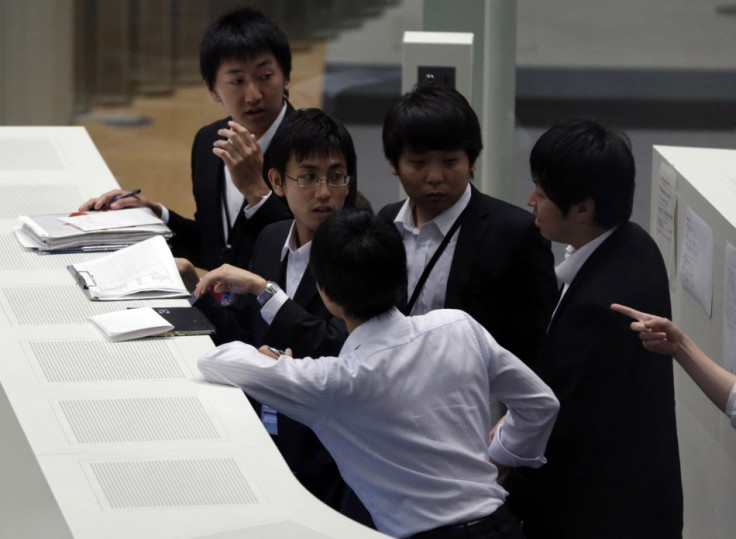Asian Markets Outside Japan Rise Ahead of US Fed Decision

Most Asian markets traded higher on 18 September, ahead of the US Federal Reserve's monetary stimulus decision.
Australia's S&P/ASX finished 0.25% lower or 13.10 points at 5,238.10.
Japan's Nikkei finished 1.35% higher or 193.69 points at 14,505.36.
India's BSE Sensex was trading 0.28% higher or 54.96 points to 19,858.99.
Hong Kong's Hang Seng was trading 0.11% higher or 25.67 points to 23,206.19.
The Shanghai Composite was trading 0.42% higher or 9.11 points to 2,194.67.
Financial markets in South Korea will remain closed for the rest of the week for the Korean thanksgiving holidays.
The Fed is expected to provide clarity on the future pace of its $85bn bond-buying stimulus later today. Despite the the central banks' massive monthly asset buys providing significant market stimulus, analysts fear that the Fed will start paring back its asset purchase programme.
Fed Chairman Ben Bernanke will address a press conference on 18 September, after the Federal Open Market Committee meeting concludes.
"The major concern to investors today is the conclusion of the two-day Federal Open Market Committee meeting. With markets already pricing in a $10bn per month reduction in bond purchases, Ben Bernanke's forward guidance on interest rates will be a key concern for investors, if there are no surprises on the tapering front," says Tim Radford, global analyst at Rivkin Securities.
""We expect Bernanke's press conference to be dovish. The Fed will want to temper market expectations that tapering will be rapid or that FOMC participants have brought forward their expectations for the first increase in rates," says Joseph Capurso, currency strategist at Commonwealth Bank of Australia.
Wall Street Up
On Wall Street, indices ended higher on 17 September, ahead of the Fed decision and Bernanke's press conference.
The Dow finished 34.95 points higher at 15,529.73. The S&P 500 closed 7.16 points higher at 1,704.76 while the Nasdaq ended 27.85 points higher at 3,745.70.
Company Stock Movements
In Tokyo, exporters' stocks gained on a weaker yen. Semiconductor maker Tokyo Electron shot up about 6% while industrial robotics maker Fanuc added 3.3%. Gaming major Nintendo added over 1%.
Kawasaki Heavy Industries, which makes trains and gas turbines, shot up 4.7%. TV Tokyo reported the company had bagged a 180bn yen order to supply 676 cars to Long Island Rail Road in New York, US.
Consumer electronics major Sharp added 2.2%, after rallying 6.6% in the previous trading session. The Nikkei newspaper reported the firm's operating profit for the April-to-September period would be double its earlier forecast.
In Shanghai, Shanghai Material Trading, which trades in metal, automobiles and oil products, soared 10% while Shanghai International Port shot up 4% while
A free trade zone planned for Shanghai will officially open on 1 October, said China's Ministry of Commerce.
London-based banks HSBC and Standard Chartered and Hong Kong-based Bank of East Asia would be the first three foreign banks permitted to open branches in the proposed free trade zone in the Chinese financial capital, according to a media report.
Property developer Shanghai Shimao added 1% while China Merchants Property fell 2.7%.
Robust home buying pushed up the average prices of new homes across 70 Chinese cities by 8.3% year-on-year in August- the highest reading so far this year. However, the industry fears that Beijing could step in to rein-in house price inflation.
In Hong Kong, real estate developer China Resources Land lost 2.4% while rival Evergrande Real Estate Group shed 0.9%.
In Mumbai, Dr.Reddy's Laboratories, India's second-largest drugmaker, added 1.4%. The company received the US Food and Drug Administration approval to roll out its anti-cancer drug in the US.
In Sydney, gold miner Perseus Mining lost about 5% while rival Newcrest Mining was down 3% on lower gold prices.
Woodside Petroleum, Australia's second-biggest oil producer, was down about 1% after Brent crude oil prices dropped to a six-week low.
© Copyright IBTimes 2024. All rights reserved.






